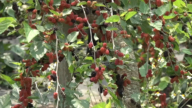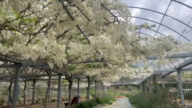【新唐人2014年03月22日讯】台湾学生反对《海峡两岸服务贸易协议》,占领立法院的行动,仍在继续。这项攸关台湾64项服务业、上千种行业、近300万人生计的贸易协定,双方权益是否对等公平﹖有超过70%的台湾受访民众表示﹕不信任。而台湾国民党立法院党团这次在国会以强度关山的方式,30秒内宣布通过“服贸”议案,所引起的这场“学运”,该如何收场﹖全球媒体都在关注。
包括英国广播公司(BBC)、美国有线电视新闻网(CNN)、《华盛顿邮报》、《纽约时报》、以及《日本经济新闻》、卡达半岛电视台等媒体网站,这两天都以专题、专栏的方式或不小的篇幅,报导台湾民众关心的“反服贸”议题。
这场被称为“太阳花学运”的“反政府黑箱行动”,21号晚间仍在继续,约有4万人在台北立法院周围静坐。
占据国会议场的学生,希望政府在21号中午做出回应,而总统马英九领导的执政团队,在学生最后通牒时间过去之后,一直没有应对动作,学生代表于是在21号下午6点召开记者会,宣布﹕将扩大抗争。
22号是周六假期,台湾中、南部民众已经酝酿北上,加入这场抗争活动。
新疆网友张海涛﹕“我觉得就像北京的89年一样,学生们都向往民主自由的舆情,不想让台湾的经济被大陆绑架。”
英国广播公司(BBC)报导,台湾人民心中始终有一种深层的恐惧,就是﹕北京当局企图以商围政,最后并吞台湾。随着两岸交流日益频繁、关系愈来愈密切,这种恐惧愈来愈加深,不信任感愈来愈强。
湖北武汉人权活动家秦永敏﹕“台湾民众非常担心大陆会从经济上控制台湾,从政治上渗透,慢慢的,更不要说民主制度发生倒退。”
台湾驻美代表金溥聪, 25号将接掌台湾国安会秘书长职位。他20号回台湾前,在美国机场向媒体表示,美国社会绝不会容忍,像台湾学生“反服贸”这样的“暴力”行为。台湾政府是否强力清场﹖成为关注焦点。
湖北武汉人权活动家秦永敏认为,台湾目前是在中共所谓的“大中华”环境底下生存发展,台湾民众这种抵抗行为,是台湾民主发展的可悲之处。
秦永敏﹕“在当局的重大政策违反民意的时候,人民能够奋起表达不同意见,甚至能够通过占领立法院的形式,来表达诉求,这是台湾民众他们非常成熟的表现。”
秦永敏表示﹕“羡慕”台湾民众成熟的民主意识。
而原大陆《河北人民广播电台》编辑朱欣欣表示,中国的民众是没有发言权的,大陆民众对台湾寄予很大希望,希望台湾成为中国大陆的民主典范,也希望台湾的民主运动能理性进行。但仍要注意中共的统战伎俩。
原《河北人民广播电台》编辑朱欣欣﹕“应当警惕政客出卖我们台湾的利益,要警惕大陆通过经济、文化手段,对台湾进行渗透,直接或间接的控制台湾的政治,因为中共邪恶的力量,它很狡猾的,千万不要怀着愿望去和大陆中共进行交往,一定要保持自己基本的底线,坚持自己基本的原则。”
有网友提出﹕台湾学生占领立法院,意在质疑国民党政府与大陆的服务贸易协议的程序不正义,而台湾国民党政府急于与大陆签署这个协议,也说明世界对中共的绥靖潮流。中共希望全世界都愿意牺牲本国的资源、环境、和人民的幸福,来换取对它合法性的认可。
山东大学退休教授孙文广 ﹕“比较起来的话,台湾的这个现状,我们感到中国差距越大了。你现在就是到广场去,你要举一个牌子,要求官员公布财产,都要把你抓到监狱。民众应该有充分表达的自由权利,集会这种自由都写在宪法里的,或者讲人权保障也是。”
台湾学生占领议会,引起了国际的关注。
日本影音网站“NICONICO LIVE”现场转播台湾学生占领立法院景象,吸引了超过80万人点阅。日本也有网友自制影片,解释台湾学生“反服贸”的原因,以及“服贸协议”带来的影响。
与“服贸”相关的关键字,最近也成为了网络热搜词。
采访/陈汉 编辑/周平 后制/孙宁
How Will Taiwan’s Sunflower Student Movement End?
The Taiwanese student protest continues in
the Legislative Yuan assembly hall, against
the Cross-Strait Service Trade Agreement.
The agreement, known to involve 64 service
industries and thousands of businesses, will
effect the livelihoods of nearly 3 million people.
Is this trade a fair deal for Taiwan?
A recent poll suggests 70% say no.
Taiwan’s ruling Kuomintang, or KMT, forcibly
passed the Agreement at a congress meeting.
It was done within 30 seconds
of announcing the motion.
This action triggered the student movement. How will
the movement end? International media are watching.
Protests over the Cross-Strait trade pact have been
widely reported by BBC, CNN, Washington Post,
New York Times, Japan Economic Times, and Al Jazeera.
This ‘Sunflower Student Movement’ is protesting against
the ‘black box processes’ of the KMT government.
The sit-in continued on March 21 with 40,000
people occupying in the Legislative Yuan in Taipei.
Students had hoped a response by noon of March 21
from President Ma Ying-jeou, but there was none.
The students declared to the
press that the protest will expand.
As the weekend is approaching, people in Southern
Taiwan are organizing trips to join the protests in Taipei.
Zhang Haitao, netizen in Xinjiang:
“I feel it is like the Beijing in 1989.
These students are yearning for democracy and
freedom of public opinion, and don’t want to see
Taiwan’s economy being hijacked by the mainland."
BBC Chinese reported that the people in
Taiwan have always had a deep-seated fear.
Beijing authorities have attempted to
annex Taiwan through it’s economy.
With increasingly frequent and close cross-strait
exchanges, fear and distrust has increased too.
Qin Yongmin, Wuhan human rights activist: “Taiwanese
people are very worried about mainlaind China controlling
and infiltrating the economics and politics of their country.
This is not to mention the regression of their democracy."
King Pu-tsung, Taiwan’s chief representative
to the US, will become Taiwan’s National
Security Council Secretary General on March 25.
On his way back to Taiwan on March 20, he told media at
the U.S. airport that American society will not tolerate
‘violent’ behavior like the Taiwanese students in the protest.
It has now become a concern that the Taiwanese
government will conduct forceful removal of protestors.
Wuhan human rights activist Qin Yongmin
indicates that it is marks a sad moment for Taiwan.
That is, the need to engage in protecting democracy
in Taiwan in such manner, because of facing the
threat from the Chinese Communist Party.
Qin Yongmin: “When a major policy violates public opinion,
the people can rise up and express different opinions.
Even if this is in the form of occupation of the
Legislative Yuan, in order to express their demands.
The people of Taiwan are clearly
demonstrating their sense of maturity."
Qin Yongmin expresses his admiration for the mature
democratic consciousness of Taiwanese people.
Zhu Xinxin, a former editor of Hebei People’s Radio Zhu
warns, that the Chinese people have no freedom of speech.
However, they have great hope for
Taiwan’s progress in democracy.
The CCP’s united front tactics are what the
Taiwanese people ought to watch out for.
Zhu Xinxin, former editor of Hebei People’s
Radio: “We should be wary of politicians
betraying the interests of Taiwan.
We should be alert to infiltration and various controlling
of Taiwan’s politics through economic and cultural means.
Watch out for the cunning and evil CCP. Don’t hold
onto any hope to interact with the Communist Party.
Taiwan must hold on to its bottom line
and insist on the basic principles."
Netizens pointed out that the Taiwanese
students’ occupying the Legislative Yuan was them
questioning the trade agreement with the mainland.
The students think that this process
bypassed any democratic progress.
However, the KMT government’s anxiety to quickly
sign the agreement also reveals the wider international
trend of appeasing the Chinese Communist Party.
The CCP wants the world to willingly sacrifice their
own resources, environment, and well-being’s of citizens.
This is done in exchange for
recognition of the CCP’s legitimacy.
Sun Wenguang, retired Professor from Shandong
University: “Taiwan’s situation is in sharp contrast to China.
Whoever openly demands Chinese officials
to declare their property will be arrested.
People deserve the freedom and
rights to fully express themselves.
The freedom of assembly and human
rights were all written in the constitution."
Taiwanese students’ occupying their governments
building has attracted international attention.
A live video broadcast of the sit-in in the
Legislature by Japanese video site Niconico
Live has drawn more than 800,000 viewers.
There are also homemade videos from Japanese netizens
explaining the reason why the students are protesting.
Relevant keywords about the Trade Agreement
have also become popular on the internet.
Interview/Chen Han Edit/Zhou Ping Post-Production/Sun Ning

























